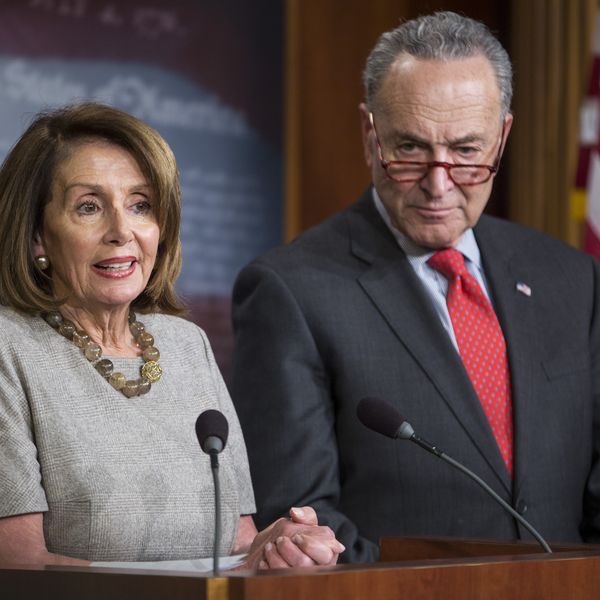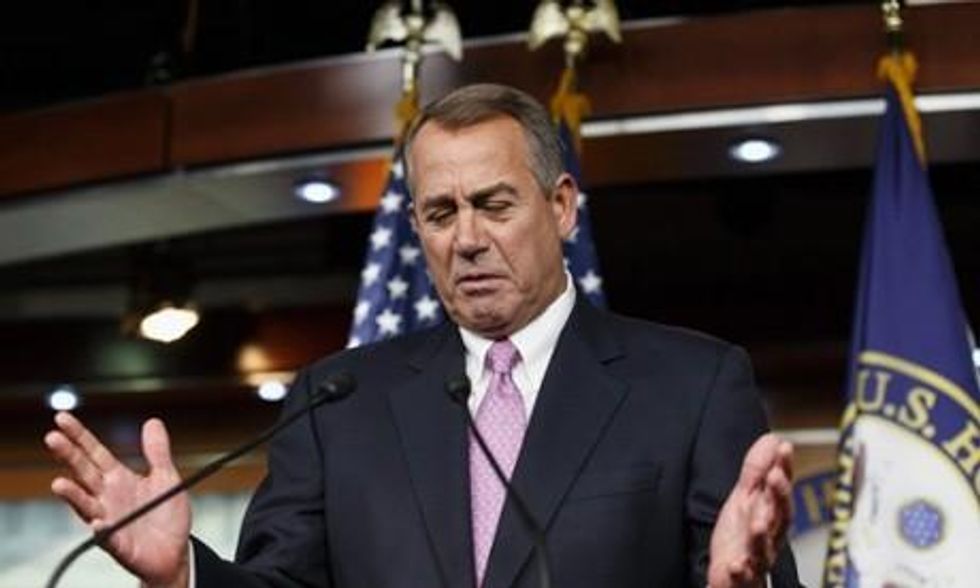By raising the debt ceiling, conservatives argue, Congress punted on addressing the obligations it's passing down to children and grandchildren and will, in the years ahead, put the nation at risk of a crisis in which global markets lose faith in America's financial commitments.
In a political system blinkered by short-term electoral deadlines and a 24-hour media blitz, it's refreshing to hear politicians consider their long-range responsibilities. There's just one problem: debt crisis projections are shaky at best. If Republicans want to look out for the grandkids, they can start by acknowledging the one catastrophe about which projections are unequivocal: climate change.
When it comes to America's impending debt crisis, official long-term projections are pretty ambiguous. This month's outlook from the authoritative and nonpartisan Congressional Budget Office (CBO) shows the federal deficit falling to less than 3% of GDP in the coming years, the lowest level yet under President Obama and roughly the average for both Republican and Democratic administrations over the past 40 years.
Even with the Baby Boomers retiring en masse, the nation's debt-to-GDP ratio may well decline over the long-term without any intervention by policymakers.
Relative to the size of the US economy, even the pessimistic debt projections that conservatives cling to are not all that - and they could be offset by a modest increase in revenue, a decline in healthcare costs, reasonably high economic growth or any of a plethora of other changes.
Remember, as the global reserve currency goes, there's still no plausible foreign competitor to the dollar. For all the hype about a "credit crisis", the nation's extremely low long-term borrowing rates remain a testament to worldwide confidence in the government's finances. And, as for Fox News's apocalyptic visions of foreign creditors using US debt as a strategic weapon, it would be impossible for China to call all US debts without devastating its own export-dependent economy - a reality that the State Department's Robert Hormats has called "Mutually Assured Depression" (MAD).
Where concern about a debt crisis is speculative at best, projections about catastrophic climate change are corroborated by the strongest expert consensus imaginable. As James Hansen pointed out in The New York Times last May, "Every major national science academy in the world has reported that global warming is real, caused mostly by humans, and requires urgent action."
Comprising thousands of technical experts from more than 120 countries, the Intergovernmental Panel on Climate Change (IPCC) is the world's definitive authority on climate change. Its latest report, released last September, is beyond doubt: "Warming of the climate system is unequivocal". The report's Summary for Policymakers, a document subject to line-by-line approval by delegates from all member countries, is chock-full of phrases like "virtually certain" and "extremely likely" - terms signifying a probability of 95-100% - that you won't find in any CBO long-term outlook in recent memory.
Forget for a moment about forecasting the future. Any acceptable climate model must be able to reliably reproduce the variability of the weather and accurately depict what's happened in the past. No such model has been able to simulate what has already happened over recent years - a sustained rise in global temperatures and sea levels - without accounting for all the CO2 we've pumped into the air. In other words, by processes of elimination (the same logic we rely on in diagnostic medicine), scientists have identified carbon pollution as the cause of global warming.
At their root, conservatives' debt hysteria and climate change denialism are both born of a basic distrust of government. That distrust may not be without its merits, but mistaking science for propaganda certainly is. Unlike debt, global climate change spells existential threats to life on earth: droughts, extreme storms, catastrophic floods, forced human migration, disrupted food supply, species extinction. Some inheritance for the grandkids.
Don't hold your breath for congressional Republicans to come around to addressing climate change, but it's important to note that they could do so without sacrificing their principles.
Bob Inglis, the former South Carolina Republican Congressman who currently heads the Energy and Enterprise Initiative, has proposed shifting taxes from income to carbon pollution dollar-for-dollar. The logic is straight out of the conservative playbook: cut taxes on what you want more of - income - and disincentivize what you want less of - greenhouse gasses.
When Ronald Reagan remarked that "Government does not solve problems; it subsidizes them," he was expressing a core tenet of GOP ideology: don't mess with free markets. True conservatives should be pushing to level the energy playing field by getting rid of market-distorting government subsidies to carbon-intensive industries.
Taking action on climate change is not only compatible with conservative ideology. It's an absolute requirement for any party that claims to take the long view.
Time for conservatives to stop kicking the can down the road.




